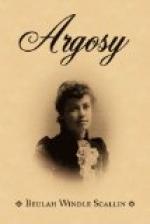“Whatever did you do to her ladyship this morning?” asked Dance as soon as she entered. “She has tasted neither bit nor sup since breakfast, but ever since that old shabby-looking fellow went away she has lain on the sofa, staring at the wall as if there was some writing on it she was trying to read but didn’t know how. I thought she was ill, and asked her if I should send for the doctor. She laughed at me without taking her eyes off the wall, and bade me begone for an old fool. If there’s not a change by morning, I shall just send for the doctor without asking her leave. Surely you and that old fellow have bewitched her ladyship between you.”
Janet in reply told Dance all that had passed at the morning’s interview, feeling quite sure that in doing so she was violating no confidence, and that Lady Chillington herself would be the first to tell everything to her faithful old servant as soon as she should be sufficiently composed to do so. As a matter of course Dance was full of wonder.
“Did you know Captain Chillington?” asked Janet, as soon as the old dame’s surprise had in some measure toned itself down.
“Did I know curly-pated, black-eyed Master Charley?” asked the old woman. “Ay—who better? These arms, withered and yellow now, then plump and strong, held him before he had been an hour in the world. The day he left England I went with her ladyship to see him aboard ship. As he shook me by the hand for the last time he said, ’You will never leave my mother, will you, Dance?’ And I said, ’Never, while I live, dear Master Charles,’ and I’ve kept my word.”
“Her ladyship has never been like the same woman since she heard the news of his death,” resumed Dance after a pause. “It seemed to sour her and harden her, and make her altogether different. There had been a great deal of unhappiness at home for some years before he went away. He and his father, Sir John—he that now lies so quiet upstairs—had a terrible quarrel just after Master Charles went into the army, and it was a quarrel that was never made up in this world. He was an awful man—Sir John—a wicked man: pray that such a one may never cross your path. The only happiness he seemed to have on earth was in making those over whom he had any power miserable. It was impossible for my lady to love him, but she tried to do her duty by him till he and Master Charles fell out. What the quarrel was about I never rightly understood, but my lady would have it that Master Charles was in the right and her husband in the wrong. One result was that Sir John stopped the income that he had always allowed his son, and took a frightful oath that if Master Charles were dying of starvation before his eyes he would not give him as much as a penny to buy bread with. But her ladyship, who had money in her own right, said that Master Charles’s income should go on as usual. Then she and Sir John quarrelled; and she left him and came to live at Deepley




